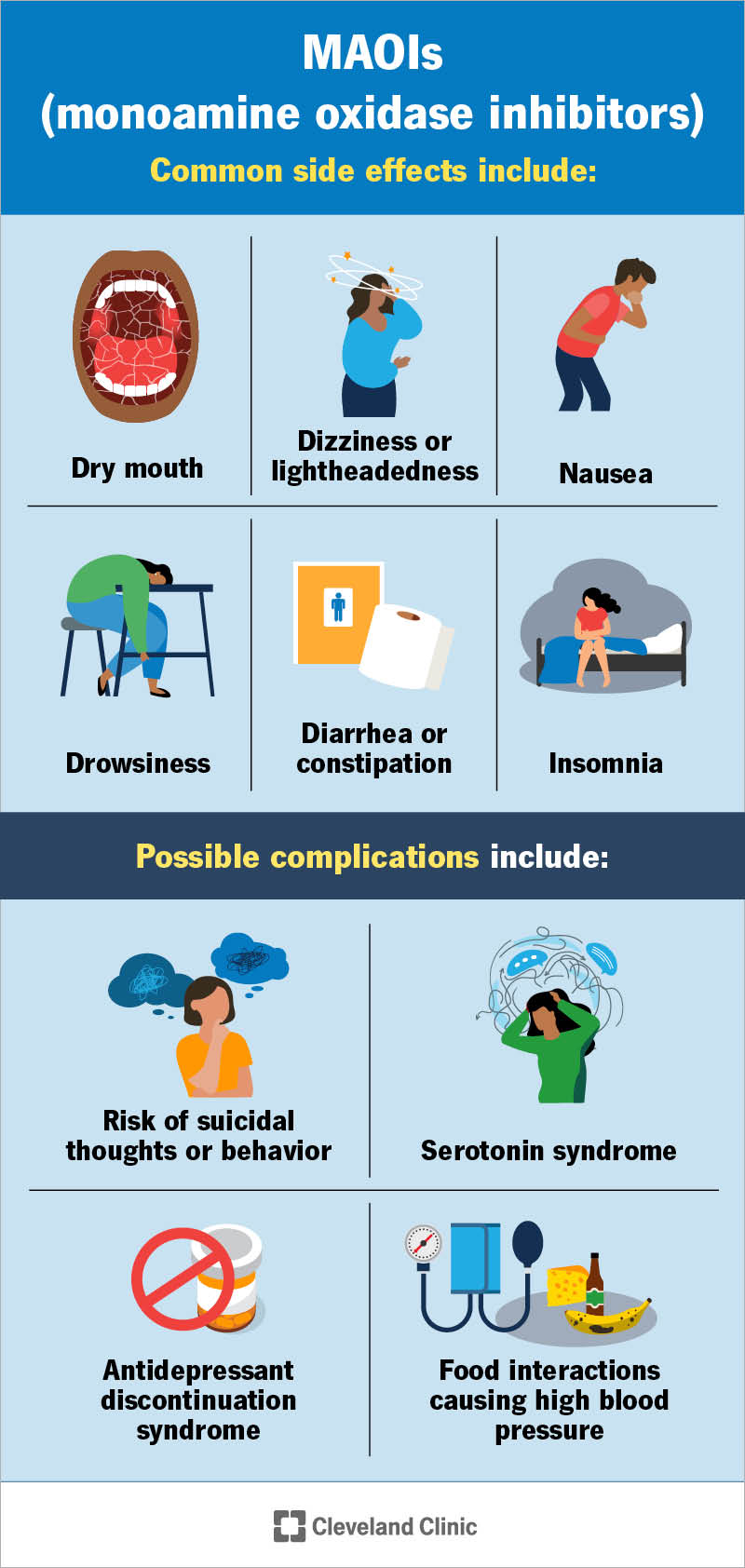MAOIs (monoamine oxidase inhibitors) are medications that help treat depression symptoms. They’re one of the least commonly prescribed antidepressants. This is because of safety concerns around food and medication interactions.
Advertisement
Cleveland Clinic is a non-profit academic medical center. Advertising on our site helps support our mission. We do not endorse non-Cleveland Clinic products or services. Policy
MAOIs (monoamine oxidase inhibitors) are medications that help treat depression symptoms. Healthcare providers prescribe them for other conditions, as well.
Advertisement
Cleveland Clinic is a non-profit academic medical center. Advertising on our site helps support our mission. We do not endorse non-Cleveland Clinic products or services. Policy
MAOIs were the first type of antidepressant invented. But providers don’t often prescribe them for depression today due to several dietary issues, side effects and safety concerns. Providers typically only prescribe them if all other classes of antidepressants haven’t helped your symptoms.
MAOIs (and their brand names) that are available in the United States include:
Each type of MAOI has different U.S. Food and Drug Administration (FDA) approvals:
Healthcare providers sometimes prescribe MAOIs for other conditions. This is an off-label, or non-FDA-approved, use of the medication.
For example, providers sometimes prescribe Selegiline for ADHD.
They may prescribe tranylcypromine off-label for:
MAOIs work by increasing the levels of certain neurotransmitters (chemical messengers) in your brain. This helps boost your mood and improve other depression symptoms.
Advertisement
More specifically, MAOIs (monoamine oxidase inhibitors) work by blocking the monoamine oxidase enzyme. This enzyme breaks down different types of neurotransmitters in your brain, including:
By blocking this enzyme, the medication increases the levels of these chemicals in your brain.
You can take MAOIs orally (by mouth) in tablet or capsule form. Selegiline also comes as a skin patch. Your healthcare provider will prescribe a certain dose and give you instructions for taking the medication.

Image content: This image is available to view online.
View image online (https://my.clevelandclinic.org/-/scassets/images/org/health/articles/maois-monoamine-oxidase-inhibitors)
Each type of MAOI has its own side effects. Be sure to talk to your healthcare provider or pharmacist about ones to look out for.
In general, common side effects of MAOIs include:
Possible complications associated with MAOIs include:
People younger than 25 years may have an increase in suicidal thoughts or behavior when taking MAOIs. This is especially the case when they first start them or change the dose.
If you or your child has suicidal thoughts or behavior, call the healthcare provider who prescribed the medication immediately. You can also dial 988 on your phone to reach the Suicide and Crisis Lifeline.
Serotonin syndrome is a potentially life-threatening drug reaction. It happens when you have too much serotonin in your body.
It can happen when you either take a new MAOI or take an increased dose. The syndrome most often occurs when you take an MAOI in addition to other medications that increase your serotonin levels. Examples include SSRIs and opioids.
Antidepressant discontinuation syndrome can happen if you suddenly stop taking an MAOI after taking it for at least six weeks.
Never stop taking your medication without talking to your healthcare provider first. Safely stopping antidepressants is a process. It usually takes at least four weeks to reduce your dose.
MAOIs prevent the breakdown of tyramine in your body, as well as in certain foods and drinks. Taking an MAOI and consuming too much tyramine causes high levels of it in your blood. This can lead to a sudden increase in blood pressure, called the tyramine pressor response.
A sudden increase in blood pressure is dangerous. In rare cases, a high tyramine level can trigger a brain bleed. This can result in death.
Foods you should avoid while taking MAOIs include:
Advertisement
Tyramine can increase with the aging of food. If you take an MAOI, aim to eat fresh foods instead of leftovers.
Be sure to talk to your healthcare provider and/or a dietitian about which foods you should avoid. Your provider may ask you to check your blood pressure at home after sampling small amounts of tyramine-containing foods.
It may take two to three weeks to notice an improvement in your symptoms after starting an MAOI. Talk to your healthcare provider if you don’t feel better after this time.
You should have regular appointments with your healthcare provider when you’re taking an MAOI to check how well it works.
Otherwise, talk to your healthcare provider if:
Due to the potential safety concerns with MAOIs, it’s important to notify every healthcare provider you see about your use of this medication.
Monoamine oxidase inhibitors (MAOIs) are an uncommon prescription medication today. But healthcare providers may still prescribe them in some cases. Taking them means being extra careful with other things you put in your body, like certain foods and medications. Talk to your provider about any concerns or questions you have. They’re available to help.
Advertisement

Sign up for our Health Essentials emails for expert guidance on nutrition, fitness, sleep, skin care and more.
Learn more about the Health Library and our editorial process.
Cleveland Clinic’s health articles are based on evidence-backed information and review by medical professionals to ensure accuracy, reliability and up-to-date clinical standards.
Cleveland Clinic’s health articles are based on evidence-backed information and review by medical professionals to ensure accuracy, reliability and up-to-date clinical standards.
Depression can hamper every aspect of your life. Cleveland Clinic experts are here to help manage your mental health so you can do the things you want.
